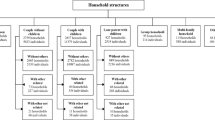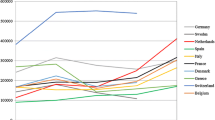Abstract
Numerous Chinese families choose to reside together with their elderly parents due to the considerable impacts of conventional values such as filial duty in Chinese society. However, as house prices rocketed up in major Chinese cities over the past decade, this arrangement is facing a sizeable challenge, therefore also raising new research question about it. This paper attempts to investigate the phenomenon of co-residence of adult children with their elderly parents in China. Using the 2013 data of China Household Finance Survey (CHFS), we document that house price is indeed a significant determinant for the pattern of intergenerational co-residence. Our empirical results can provide interesting insights into the important implication of rising house price for household residential arrangements in this country.


Similar content being viewed by others
Notes
Xinjiang, Tibet, Macao, Hong Kong and Taiwan are excluded from these provincial regions.
For housing renters, we also use the average self-reported community housing prices to replace their assessment values of housing which they were renting, because their housing valuations are usually less accurate than those of homeowners. Such treatment helps reduce the possible estimation bias caused by their housing assessments and the problem of sample selection bias caused by eliminating the renters from our sample.
We notice that Heckman two-stage approach is not applicable for our case. At the first stage of this approach households need to decide whether to purchase or rent a housing unit, while at the second state they need to choose whether to live together with their elderly parents. However, our research also needs to consider housing renters’ co-residential choices with their elderly parents as we mentioned above, so our research has no such choice problem of buying or renting.
We do not take account of elderly parents’ healthy status in regression. This is because when the elderly parents live together with their adult children, their healthy status might be improved. This will result in the problem of endogeneity in regression caused by the reverse causality between co-residence with elderly parents and their healthy status.
Intergenerational transfer might also matter for household residential decisions. On one hand, high intergenerational transfer may increase the intergenerational closeness and therefore the probability of intergenerational co-residence with elderly parents. On the other hand, however, adult children and their parents are more likely to share their incomes and expenses when living together and therefore raise their intergenerational transfer. Thus, adding the intergenerational transfer to our regression models will cause the endogenous problem of this research.
For more details about probit regression, see for example Wooldridge (2002).
References
Aquilino, W. S. (1990). The likelihood of parent–child coresidence: Effects of family structure and parental characteristics. Journal of Marriage and the Family, 52(2), 405–419. https://doi.org/10.2307/353035
Aron, J., Duca, J., Muellbauer, J., Murata, K., & Murphy, A. (2012). Credit, housing collateral, and consumption: Evidence from Japan, the U. K., and the U.S. Review of Income and Wealth, 58(3), 397–423. https://doi.org/10.1111/j.1475-4991.2011.00466.x
Aron, J., Muellbauer, J., & Murphy, A. (2006). Housing wealth, credit conditions and consumption. In MPRA Paper 24485. Germany: University Library of Munich.
Attanasio, O. P., Blow, L., Hamilton, R., & Leicester, A. (2009). Booms and busts: Consumption, house prices and expectations. Economica, 76(301), 20–50. https://doi.org/10.1111/j.1468-0335.2008.00708.x
Attanasio, O. P., & Weber, G. (1994). The UK consumption boom of the late 1980s: Aggregate implications of microeconomic evidence. Economic Journal, 104(427), 1269–1302. https://doi.org/10.2307/2235449
Beard, J., & Bloom, D. (2015). Towards a comprehensive public health response to population ageing. Lancet, 385(9968), 658–661. https://doi.org/10.1016/S0140-6736(14)61461-6
Bethencourt, C., & Ríos-Rull, J.-V. (2009). On the living arrangements of elderly widows. International Economic Review, 50(3), 773–801. https://doi.org/10.1111/j.1468-2354.2009.00548.x
Bhatia, K. B. (1987). Real estate assets and consumer spending. Quarterly Journal of Economics, 102(2), 437–444. https://doi.org/10.2307/1885072
Bloom, D., Chatterji, S., Kowal, P., Lloyd-Sherlock, P., McKee, M., Rechel, B., Rosenberg, L., & Smith, J. (2015). Macroeconomic implications of population ageing and selected policy responses. Lancet, 385(9968), 649–657. https://doi.org/10.1016/S0140-6736(14)61464-1
Campbell, J. Y., & Cocco, J. F. (2007). How do house prices affect consumption? Evidence from micro data. Journal of Monetary Economics, 54(3), 591–621. https://doi.org/10.1016/j.jmoneco.2005.10.016
Case, K. E., Quigley, J. M., Shiller, R. J. (2001). Comparing wealth effects: The stock market versus the housing market. NBER Working Paper 8606.
Chu, C. Y. C., Xie, Y., & Yu, R. R. (2011). Coresidence with elderly parents: A comparative study of southeast China and Taiwan. Journal of Marriage and Family, 73(1), 120–135. https://doi.org/10.1111/j.1741-3737.2010.00793.x
Clark, W., & Deurloo, M. (2006). Aging in place and housing over-consumption. Journal of Housing and the Built Environment, 21(3), 257–270. https://doi.org/10.1007/s10901-006-9048-3
Clark, W., & Onaka, J. (1985). An empirical test of a joint model of residential mobility and housing choice. Environment and Planning A, 17(7), 915–930. https://doi.org/10.1068/a170915
Costa, D. (1997). Displacing the family: Union army pensions and elderly living arrangements. Journal of Political Economy, 105(6), 1269–1292. https://doi.org/10.1086/516392
Doty, P. (1986). Family care of the elderly: The role of public policy. Milbank Quarterly, 64(1), 34–75. https://doi.org/10.2307/3350005
Engelhardt, G., & Greenhalgh-Stanley, N. (2010). Home health care and the housing and living arrangements of the elderly. Journal of Urban Economics, 67(2), 226–238. https://doi.org/10.1016/j.jue.2009.09.007
Ermisch, J. F., Findlay, J., & Gibb, K. (1996). The price elasticity of housing demand in Britain: Issues of sample selection. Journal of Housing Economics, 5(1), 64–86. https://doi.org/10.1006/jhec.1996.0004
Ermisch, J., & Di Salvo, P. (1997). The economic determinants of young people’s household formation. Economica, 64(256), 627–644. https://doi.org/10.1111/1468-0335.00103
Goodman, A., & Kawai, M. (1982). Permanent income, hedonic prices, and demand for housing :New evidence. Journal of Urban Economics, 12(2), 214–237. https://doi.org/10.1016/0094-1190(82)90016-X
Hanushek, E., & Quigley, J. (1980). What is the price elasticity of housing demand? Review of Economics and Statistics, 62(3), 449–454. https://doi.org/10.2307/1927113
Hooimeijer, P., & Schutjens, V. (1991). Changing lifestyles and housing consumption: A longitudinal approach. Journal of Housing and the Built Environment, 6(2), 143–158. https://doi.org/10.1007/BF02496574
Iacovou, M. (2010). Leaving home: Independence, togetherness and income. Advances in Life Course Research, 15(4), 147–160. https://doi.org/10.1016/j.alcr.2010.10.004
Jones, L. (1997). The tenure transition decision for elderly homeowners. Journal of Urban Economics, 41(2), 243–263. https://doi.org/10.1006/juec.1996.1099
Kochar, A. (2000). Parental benefits from intergenerational co-residence: Empirical evidence from rural pakistan. Journal of Political Economy, 108(6), 1184–1289. https://doi.org/10.1086/317683
Kochar, A. (2014). Intergenerational co-residence and schooling. Journal of the Economics of Ageing, 4, 8–23. https://doi.org/10.1016/j.jeoa.2014.09.009
Lee, R., & Mason, A. (2010). Some macroeconomic aspects of global population aging. Demography, 47(suppl), S151–S172.
Lee, K., & Painter, G. (2014). Housing tenure transitions of older households: What is the role of child proximity? Real Estate Economics, 42(1), 109–152. https://doi.org/10.1111/reec.12018
Lim, G.-C., & Lee, M.-H. (1993). Housing consumtpion in urban China. Journal of Real Estate Finance and Economics, 6(1), 89–102. https://doi.org/10.1007/BF01098430
Lustig, H. N., & Van Nieuwerburgh, S. G. (2005). Housing collateral, consumption insurance, and risk premia: An empirical perspective. Journal of Finance, 60(3), 1167–1219. https://doi.org/10.1111/j.1540-6261.2005.00759.x
Lutz, W., Sanderson, W., & Scherbov, S. (2008). The coming acceleration of global population ageing. Nature, 451(7179), 716–719. https://doi.org/10.1038/nature06516
Mason, K. O. (1992). Family change and support of the elderly in Asia: What do we know? Asia-Pacific Population Journal, 7(3), 13–32.
McGarry, K., & Schoeni, R. (2000). Social security, economic growth, and the rise in elderly widows’ independence in the twentieth century. Demography, 37(2), 221–236. https://doi.org/10.2307/2648124
McLeod, P. B., & Ellis, J. R. (1982). Housing consumption over the family life cycle: An empirical analysis. Urban Studies, 19(2), 177–185. https://doi.org/10.1080/00420988220080301
Muellbauer, J., & Murphy, A. (1997). Booms and busts in the UK housing market. Economic Journal, 107(445), 1701–1727. https://doi.org/10.1111/j.1468-0297.1997.tb00076.x
Myers, D., & Gearin, E. (2001). Current preferences and future demand for denser residential environments. Housing Policy Debate, 12(4), 633–659. https://doi.org/10.1080/10511482.2001.9521422
Painter, G., & Lee, K. (2009). Housing tenure transitions of older households: Life cycle, demographic, and familial factors. Regional Science and Urban Economics, 39(6), 749–760. https://doi.org/10.1016/j.regsciurbeco.2009.07.006
Plott, C. R., & Zeiler, K. (2007). Exchange asymmetries incorrectly interpreted as evidence of endowment effect theory and prospect theory? American Economic Review, 97(4), 1449–1466. https://doi.org/10.1257/aer.97.4.1449
Ruggles, S. (2007). The decline of intergenerational coresidence in the United States, 1850 to 2000. American Sociological Review, 72(6), 964–989. https://doi.org/10.1177/000312240707200606
Ruggles, S. (2011). Intergenerational coresidence and family transitions in the United States, 1850-1880. Journal of Marriage and Family, 73(1), 136–148. https://doi.org/10.1111/j.1741-3737.2010.00794.x
Schafer, R. (1999). Determinants of the living arrangements of the elderly. In Working paper W99–6, joint Center for Housing Studies. Harvard: University.
Takáts, E. (2012). Aging and house prices. Journal of Housing Economics, 21(2), 131–141. https://doi.org/10.1016/j.jhe.2012.04.001
Ting, G., & Woo, J. (2009). Elder care: Is legislation of family responsibility the solution? Asian Journal of Gerontology and Geriatrics, 4(2), 72–75.
Wooldridge, J. M. (2002). Econometric analysis of cross section and panel data. Cambridge: MIT Press.
Wittenberg, R., Pickard, L., Comas-Herrera, A., Davies, B., & Darton, R. (2001). Demand for long-term care for older people in England to 2031. Health Statistics Quarterly, 12, 5–17.
Yang, F. (2009). Consumption over the life cycle : How different is housing? Review of Economic Dynamics, 12(3), 423–443. https://doi.org/10.1016/j.red.2008.06.002
Yin, T. (2010). Parent–child co-residence and bequest motives in China. China Economic Review, 21(4), 521–531. https://doi.org/10.1016/j.chieco.2010.05.003
Zabel, J. (2004). The demand for housing services. Journal of Housing Economics, 13(1), 16–35. https://doi.org/10.1016/j.jhe.2003.12.002
Zhang, J. (2016). House price expectations: Unbiasedness and efficiency of forecasters. Real Estate Economics, 44(1), 236–257. https://doi.org/10.1111/1540-6229.12095
Acknowledgments
We would like to thank Li Gan, Han Li, Hongyu Liu, Zan Yang, S K Wong and participants at the 2015 Asia Pacific Real Estate Research Symposium for helpful comments. Xiaoying Deng also acknowledges financial support from the National Science Foundation of China (71703095), and Gang-Zhi Fan acknowledges financial support from the National Research Foundation of Korea (NRF-2016S1A5A2A01023242). Any errors are our own.
Author information
Authors and Affiliations
Corresponding author
Rights and permissions
About this article
Cite this article
Yi, D., Deng, X., Fan, GZ. et al. House Price and co-Residence with Older Parents: Evidence from China. J Real Estate Finan Econ 57, 502–533 (2018). https://doi.org/10.1007/s11146-018-9653-4
Published:
Issue Date:
DOI: https://doi.org/10.1007/s11146-018-9653-4




